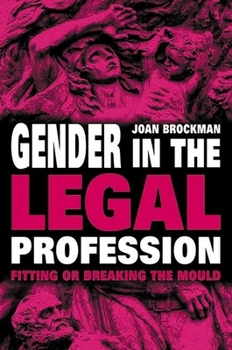Gender in the Legal Profession: Fitting or Breaking the Mould
The history of the legal profession in Canada and elsewhere is one of the exclusion of women, Aboriginals, ethnic and racial minorities, and those from less privileged classes. Based on face-to-face interviews with 50 women and 50 men called to the Bar in British Columbia during the past 3-7 years, Joan Brockman has studied this phenomenon and tried to determine reasons why such exclusion has been practised and what its effects have been, particularly with respect to women. Although legal barriers that historically prevented women from entering the legal profession have been removed, informal and structural barriers that impede women's full participation within the profession remain. Much of the discrimination still experienced stems from expectations that women, in particular, will assume primary responsibilities for child care, elder care, emotional stability in the home, household management, and other domestic matters. In addition, some women still experience sexual harassment and discrimination even if they have managed to reduce or avoid additional domestic responsibilities. There have, to be sure, been changes and accommodations made for women in the legal workforce, and men as well as women have helped to make them. But, Brockman concludes, until there is significant change in how women are perceived in relation to domestic duties, it is unlikely that they will attain equality within the legal profession. The profession will only change when perceptions of the family change, at which point women will not only fit the mould at work, but men also will fit the mould at home.
Format:Hardcover
Language:English
ISBN:0774808349
ISBN13:9780774808347
Release Date:December 2001
Publisher:UBC Press
Length:259 Pages
Customer Reviews
0 rating





